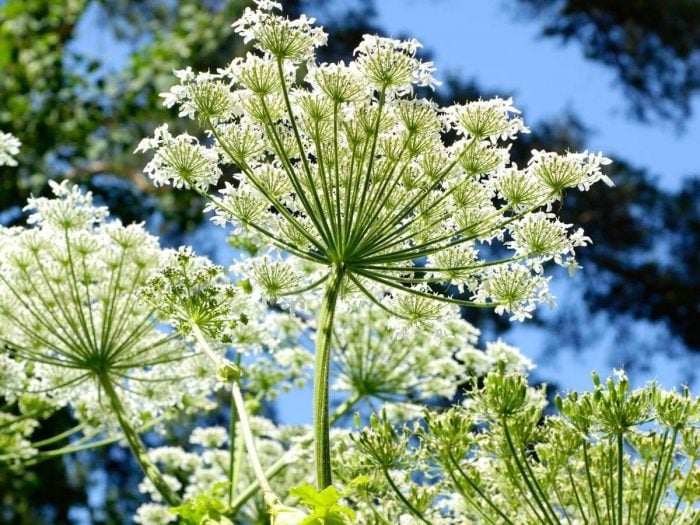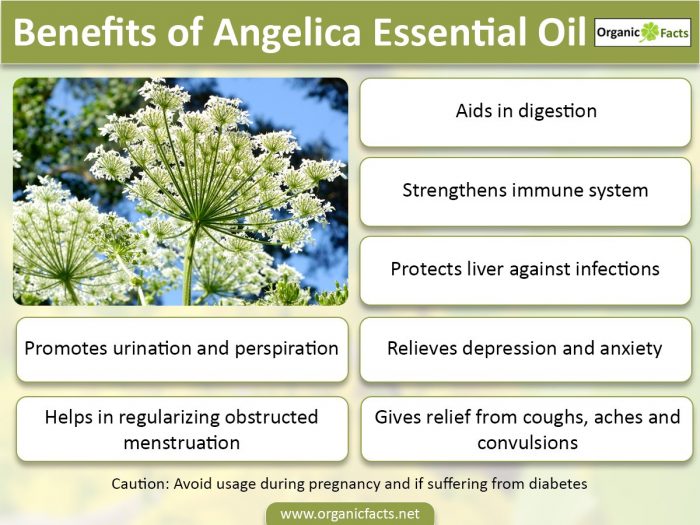The health benefits of angelica essential oil can be attributed to its properties as an anti-spasmodic, carminative, depurative, diaphoretic, digestive, diuretic, hepatic, emmenagogue, expectorant, febrifuge, nervine, stimulant, stomachic, and a tonic substance.
What is Angelica Essential Oil?
Angelica essential oil is extracted through steam distillation of the angelica rhizome (root nodules), seeds, and the whole herb. It is believed to basically be an African herb that made its way into Europe in the 16th Century and gained tremendous popularity as a treatment for the plague, which was a frequent and dreaded visitor to Europe in those days. It thrived well in Europe and as the years passed, its other medicinal properties were discovered. Angelica is also widely used as a flavoring agent in the food & beverage industry due to its sweet, spicy aroma.
Angelica Essential Oil Nutrition Facts
The medicinal properties of Angelica come mainly from its essential oil which is composed of constituents like alpha-pinene, camphene, beta pinene, sabinene, alpha phellandrene, bornyl acetate, beta phellandrene, beta bisabolene, copaene, cryptone, cis ocimene, humulene oxide, limonene, myrcene, pentadecanolide, para-cymene, rho cymenol, trans ocimene, terpinolene, terpineol, and tridecanolide.
Health Benefits of Angelica Essential Oil
Let’s delve a bit deeper into some of its renowned medicinal properties before you actually use it!
Antispasmodic
Where there is spasming, there are cramps, coughs, aches, diarrhea, nervous afflictions, and convulsions. What actually is a spasm? It is an involuntary and unpredictable contraction in the respiratory tracts, muscles, nerves, blood vessels, and internal organs resulting in severe coughs, cramps, convulsions, obstructed blood circulations, aches in the stomach and chest, and other symptoms. The only way out is to induce relaxation in the affected parts, which angelica essential oil is able to do. This oil relieves spasms and gives relief from the painful symptoms discussed above.

Angelica may have applications in treating epilepsy and anxiety. Photo Credit: Shutterstock
Carminative
The relaxing effect of angelica oil is beneficial in driving out gas from the intestines as well. This relaxes the intestinal and abdominal muscles and lets the gases pass through a downward motion, which is much healthier than letting them build up and push upwards on the torso. This gives immense relief from troubles related to excess gas, such as indigestion, stomach aches, headaches, cramps, flatulence, nausea, and high blood pressure.
Depurative
Depurative means an agent that purifies the blood. The angelica essential oil does exactly that with great efficiency. It is considered a diuretic (promotes urination) and a diaphoretic (promotes sweating) and thus it speeds up the removal of toxins like uric acid and others, including excess salt, water, fat, and bile from the body through urination and sweat. Therefore, it also gives relief from ailments associated with their accumulation. In this way, it lowers blood pressure and reduces fat (protecting your heart) along with giving relief from troubles like rheumatism, arthritis, gout, and renal calculi.
Diaphoretic
Angelica essential oil promotes sweating in the body. Sweating is the natural method for removing toxins and waste products from the body. Sweat is not just saline and foul-smelling water. Apart from the water and salts like sodium chloride and magnesium chloride, sweat also contains sebum, fats, uric acid, bile, and other toxic elements that are not welcome in our body. Therefore, sweat performs the important task of disposing of them. It helps increase the potassium ratio in the blood, thereby reducing the blood pressure, lowering fat content, and decreasing weight. Furthermore, removing uric acid and other toxins can give relief from rheumatism and arthritis.
Digestive
Angelica essential oil promotes digestion by stimulating the secretion of digestive juices like acid and bile into the stomach. It also promotes the proper movement of food through the intestines and absorption of the digested food by intestinal villi.
Diuretic
This property may be a bliss for those suffering from chronic renal failure, the excess accumulation of water in the body, or for those who are suffering from renal calculi, obesity, hypertension, and symptoms associated with the accumulation of toxins in the body such as rheumatism, arthritis, and gout. As a diuretic, angelica essential oil increases frequency and quantity of urination, which helps remove excess water, salts, fat (urine contains up to 4% fat), and toxins like uric acid. This provides effective protection from the symptoms discussed above.
Hepatic
The angelica essential oil protects the liver and makes it function well by stimulating secretions from that organ. It also shields the liver from infections and helps heal wounds in it, if any are present.
Emmenagogue
This oil also triggers the opening of obstructed menstruation and makes it more regular. As a bonus, one gets relief from the other symptoms associated with periods as well, such as headaches, abdominal cramps, nausea, vomiting, and fatigue.
Expectorant
Being an expectorant, the essential oil of angelica clears out the accumulation of phlegm in the respiratory tracts and also fights the infections that cause colds, thereby giving relief from cold and cough, sinusitis, and congestion in the lungs.

Angelica essential oil is helpful in relieving many health conditions like slow digestion and poor immunity. Photo Credit: Shutterstock
Febrifuge
This essential oil is also capable of reducing fever by fighting the infections that cause the fever. The diaphoretic and diuretic properties of this oil also contribute to this effect, since the removal of toxins and waste from the body speeds up the recovery time of infections. Perspiration also helps reduce fevers.
Nervine
This oil also acts as a tonic for the nerves. It is effective in treating nervous afflictions and disorders and in strengthening the nerves. Angelica oil is a relaxant and stimulant, therefore, it sedates the nervous afflictions and relaxes them in cases of shock and hyper-reactivity, while also stimulating them in order to make us more active and alert.
Relaxant
This oil has a relaxing effect on the body, the mind, and the nervous system. This becomes particularly beneficial in situations of shock, depression, anxiety, anger, and hypertension. [1]
Stimulant
In contrary to its behavior as a relaxant, it is a stimulant for the systems functioning inside the body. It stimulates blood circulation, the secretion of hormones, enzymes, and other juices, and also stimulates metabolic processes, including digestion, absorption, and excretion. This attribute, in total, stimulates healthy growth.
Stomachic
The simplest sentence that can best describe angelica essential oil’s stomachic property is that it is good for the stomach. It maintains the stomach in a good shape by maintaining the proper balance of acids and bile and by protecting it from infections. It also helps heal any sorts of wounds or ulcers that are present in the stomach.
Tonic
Angelica essential oil promotes the overall development of health, boosts growth, and strengthens the immune system of the body.
Other Benefits
It is good for the lymphatic system and provides an effective treatment for bronchitis, asthma, sciatica, headaches, infections, anorexia, anemia, and psoriasis. It is also rich in anti-seizure properties and this is attributed to the presence of terpenes. [2]
Word of Caution: It should be avoided during pregnancy and by diabetics. It can cause skin irritation in higher concentrations and also photo-toxicity. Higher doses of this oil can cause excessive stimulation or hyperactivity of the nervous system.
Blending: The essential oil of angelica blends well with basil, chamomile, geranium, grapefruit, lavender, lemon, mandarin, and patchouli essential oils.
